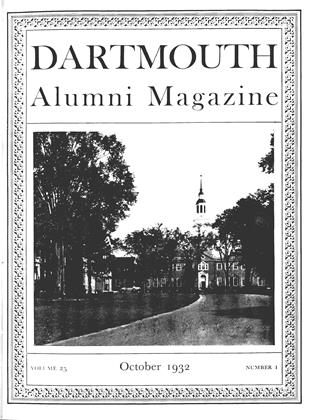In this group of younger ball carriers, four have apparently earned the right to be called the varsity quartet. These players are Roald Amundsen Morton, David Hedges, Bill Clark and Sammy Fishman. Morton and Fishman will be remembered, the former as a slashing fullback during the latter part of the 1931 campaign, and the latter as a sensational, highly touted quarterback who never had a chance to prove his worth on account of an injury which kept him out of the major game schedule last Fall. Hedges is also a letter man at fullback from last Fall, leaving the towheaded Mr. Clark of Amesbury, Massachusetts as the only newcomer to the varsity backfield.
Young Clark apparently has the makings. An Exeter product, where he captained the Exeter team, he chose Dartmouth and likewise led the freshman team last Fall to its third straight undefeated season. More than that, his field goal against Princeton won that game, 3-0, and enabled the little Green to chalk up its first win over the Tigers in years. Last Fall he was winning some sort of a bet on punting on the freshman field, and the furore created by 70- and 75-yard kicks was enough to send Jack Cannell over to that field to check up. But too much advance publicity is no good for these sophomores, so we have not been saying much about Mr. Clark for the present and leaving the case with this single paragraph.
At this point we should go on to tell of the backfield replacements, but a fellow by the name of John William Knibbs III has just dropped in, a week late for practise, incidentally, and his reporting adds just a little more enthusiasm to the setting, for we wondered if he were going to report. Ever hear of John William Knibbs III of Mount Vernon, N. Y.? You older readers of the MAGAZINE certainly know of the exploits of his father in the early hundreds.
But if any credit is to be given out for the fine showing of a fair Dartmouth team made against Yale, Harvard and Cornell last year, he should get a very large parcel. He didn't play in any major games, but he was the fellow who whipped up a gang of recruits who took the part of the opposition every week, depending on who the opponent was to be. Knibbs has played the role of Barry Wood, Albie Booth and Bart Viviano all in one season, and we for one would like to see him in a real game, for he has his father's grit.
The second set of backs shapes up with Jack Hill, George Stangle, John Donovan, Wilbur Powers, Lyn Shollenberger and Harry Deckert, who have all been alternating at the various positions. There may be more before the season is under way. Of the lot, several are newcomers. Jack Hill is a former Worcester Academy player who seems to be a fast, light capable back. Deckert was a regular on the freshman team, and this 178-pound St. Louis boy will be a valuable man.
Of all, the history of Lyn Shollenberger is the most interesting, for his return marks the first comeback of a freshman team which was the most unfortunate in recent Dartmouth history—that of the Class of 1933. Shollenberger was captain of that team, and hardly a first string man ever reached the varsity on account of scholastic difficulties. We saw him first as a member of the Lake Forest Team which lost to the Dartmouth freshman in Chicago in 1928, and he carried the brunt of a losing attack. The following year he, with Howard Wilson, Sted Sampson and Dan Rollins, crushed the Harvard freshmen in the Stadium 21-0. It was a powerful combination, but none of this quartet reached the varsity, although Rollins was eligible.
Now Shollenberger is back, and his former teammate, Howard Wilson, will be playing for New Hampshire against him. It was Wilson who scored all three Dartmouth touchdowns against Harvard, and this coming Wildcat-Indian battle will be an interesting one.
There are others—Wilbur Langdon Powers of hockey fame, who is a highstrung, fleet sort of runner who looked well last year in practice, and Jack Mahoney, who copped all the Carnival speed skating titles when Jack Shea was unable to compete.
 View Full Issue
View Full Issue
More From This Issue
-
 Article
ArticleCHANGE IS OPPORTUNITY
October 1932 By Ernest Martin Hhopkins -
 Class Notes
Class NotesClass of 1922
October 1932 By Francis H. Horan -
 Class Notes
Class NotesClass of 1911
October 1932 By Prof.Nathaniel G. Burleigh -
 Article
ArticleHANOVER BROWSING
October 1932 By Rees Higgs Bowen -
 Class Notes
Class NotesClass of 1902
October 1932 By Hermon W. Farwell -
 Class Notes
Class NotesClass of 1905
October 1932 By Arthur E. Mcclary








